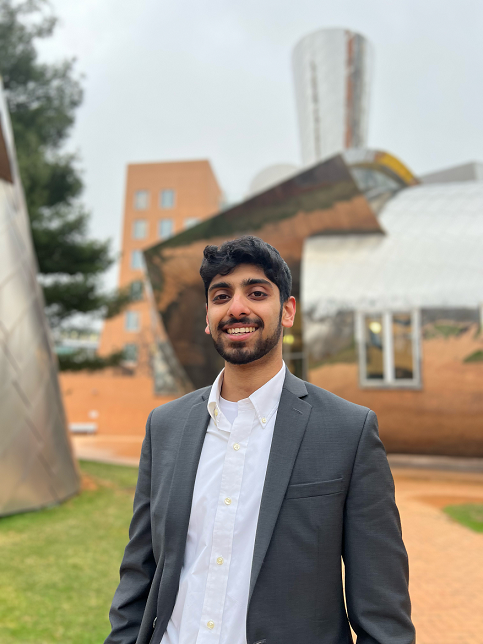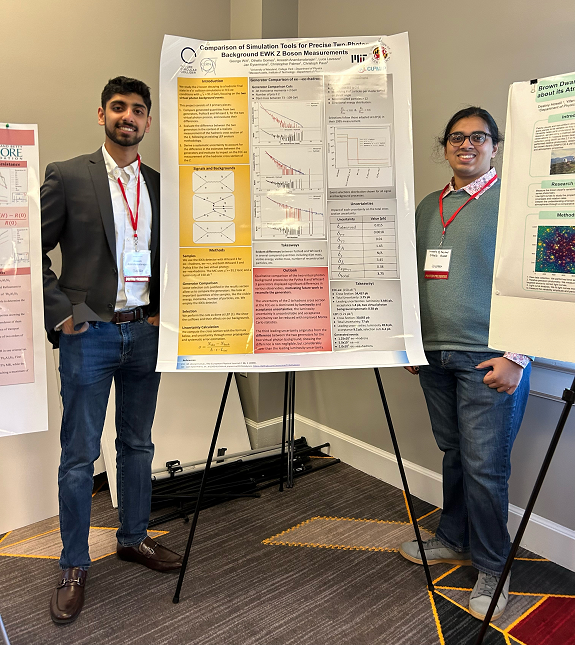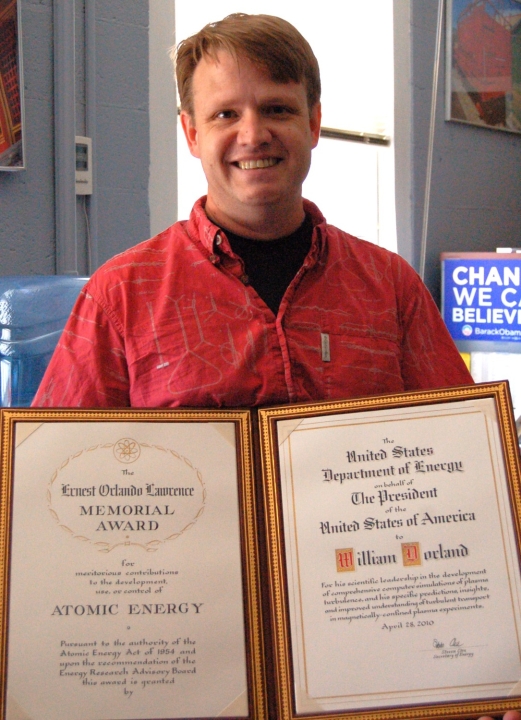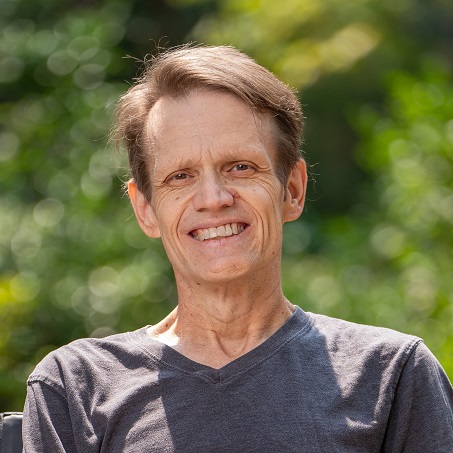- Details
-
Published: Wednesday, September 11 2024 06:24
For the last four years, Aneesh Anandanatarajan has kept a running list of “big questions” about the universe and how it works. He started the list in high school but shows no signs of slowing down in his senior year as an astronomy and physics dual-degree student at the University of Maryland. Aneesh Anandanatarajan
Aneesh Anandanatarajan
“I am the type of person to ask questions until someone tells me to stop,” Anandanatarajan said. “I have about 40 questions on my list, and I like to return to them to see how I’ve progressed in terms of what I've learned and what I’m interested in.”
One of his early questions—how are electricity and magnetism related?—was written at a time when Anandanatarajan knew little about plasma astrophysics. Now, he’s conducting research in Physics Assistant Professor Sasha Philippov’s lab, where he uses physics-based simulations to study the turbulent environment and complex electromagnetic interactions around supermassive black holes.
While Anandanatarajan loves asking questions, he’s happiest sharing what he learned with others. As the tutoring chair for UMD’s Society of Physics Students, Anandanatarajan has become a physics ambassador while strengthening his knowledge of the subject. Aneesh Anandanatarajan and Othello Gomes
Aneesh Anandanatarajan and Othello Gomes
“As a tutor and as the tutoring chair, it has been important to me to know physics well. I want to fully understand where these different concepts and equations come from,” Anandanatarajan said. “One of the things I'm most excited about is sharing physics with other people.”
Virtually hooked
Anandanatarajan has been interested in exotic objects like black holes and neutron stars since middle school, but he didn’t discover this passion in a lab or a planetarium. While watching YouTube one day, he found a channel with buzzy animated videos about popular science topics, including astronomy and physics. A few videos later, he was hooked.
“It captured my interest in more ways than I expected because I didn’t really know much about those subjects before middle school,” he said. “Over time, I watched more videos and realized that astronomy might be something I’d like to learn more about at an academic and professional level.”
Anandanatarajan said he was initially attracted to UMD’s “great astronomy program,” but he was thrilled to learn that he could add a second degree in physics by taking a few more classes. He’s enjoyed learning from professors who are exploring diverse fields of research.
“There are a lot of really great research topics here at Maryland and professors that are doing active research in those fields,” he said. “I’ve had a lot of great experiences with professors that want me to succeed and have pushed me to succeed.”
One of those professors is Philippov, whom Anandanatarajan started working with in spring 2024. Philippov studies high-energy astrophysics through a blend of theory and computer modeling with a focus on the physics of plasmas—hot, ionized gas surrounding black holes, neutron stars and other celestial objects.
Anandanatarajan is using computer simulations to study how plasmas composed of electrons and positrons interact with other particles in the corona, an extremely hot and highly magnetized region that surrounds black holes, our sun and other space objects. Through a process called annihilation, these interactions can produce gamma rays, a type of radiation that astronomers can study to learn more about the universe.
“The corona is a very mysterious region that a lot of astronomers are very interested in probing,” Anandanatarajan said. “It’s essentially a breeding ground for electromagnetic activity, so we'd like to understand the phenomena that occur in that region because there are a lot of unknowns when it comes to our observations.”
Through this research, Anandanatarajan learned how to run Monte Carlo simulations that predict the probability of different outcomes—a skill that proved useful on other projects, like the up-and-coming study of high-energy particle collisions.
When interests collide
During the spring 2024 semester, a project in Physics Assistant Professor Christopher Palmer’s PHYS 441: “Introduction to Particle Physics” course let Anandanatarajan play an unexpected role in the next Large Hadron Collider (LHC).
During the course, Palmer teamed up with faculty at MIT to give students a front-row seat to discussions involving the Future Circular Collider (FCC), a proposed collider that would push the boundaries of particle physics beyond the capabilities of the LHC. The hope is that an upgraded collider could discover new particles or find evidence that deviates from the Standard Model of physics, which describes the fundamental forces that shape the universe.
Anandanatarajan and other students at UMD and MIT analyzed Monte Carlo simulations to determine how to precisely measure novel processes produced in electron-positron collisions from the FCCee accelerator, the first stage of the FCC.
“Essentially what we wanted to do was characterize different kinematic properties, such as the energy, momentum and angles at which these produced particles came out,” Anandanatarajan explained.
In March, this culminated in a visit to the second annual FCC workshop, where students presented their projects and spoke with leaders in the field.
“We learned a lot about how high-energy physics is conducted and the planning that is needed for a mega collider that may or may not be built 30 years from now,” Anandanatarajan said. “We talked to many different experts in the field who were thankfully friendly and willing to talk to undergrads about these types of topics.”
This experience initially felt disparate from his other projects, but Anandanatarajan realized that electron-positron collisions and large Monte Carlo simulations play an important role in astrophysics, too. After he earns his undergraduate degree, Anandanatarajan plans to continue studying astrophysics in a Ph.D. program that will allow him to keep asking—and answering—those big questions he’s carried with him for years.
Until then, he looks forward to spending his senior year sharing his passion with anyone willing to listen. He has several ideas for the Society of Physics Students—including a possible YouTube channel, harking back to his initial inspiration—to get students more engaged in physics.
“Making people excited about physics has always been a passion of mine,” he said. “I feel like I enjoy physics more than the average person, so I want to share those feelings with others and show them all of the cool things that physics has to offer.”




